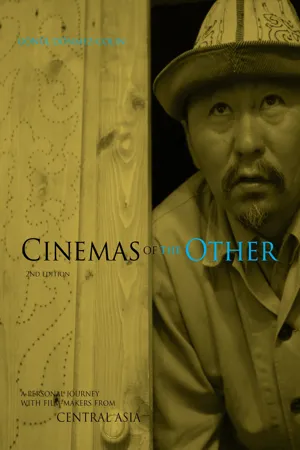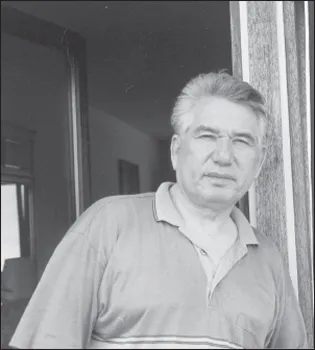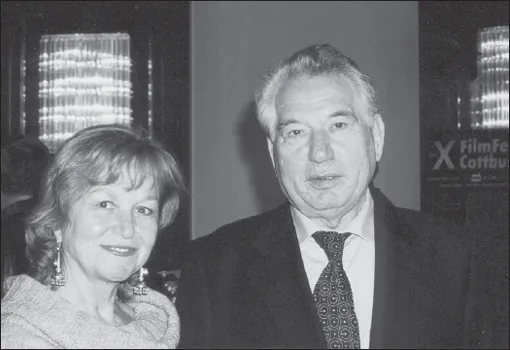![]() KYRGYZSTAN
KYRGYZSTAN ![]()
CHINGIZ AITMATOV
Chingiz Aitmatov is one of the most well-known writers of Central Asia in the western world. His career flourished in the former Soviet Union where he told the tales of his people, the Kyrgyz of the steppes, from the turbulent years following the world wars to the establishment of the Soviet rule and its outcome, often employing the dominant language, Russian. His first novel, Dzamilja/Cemila (1958), was described by the French writer Aragon as ‘the most beautiful love story of the world’. In 1963, he was awarded the Lenin Prize for literature. His relationship with the Soviet authorities, however, was not always so amiable. Ak Keme/The White Boat (1971), which exposed the moral destruction of the Kyrgyz peasants in the world of evil, was ostracized for its pessimistic ending – the suicide of the little boy. The Dream of the Wolf (1987) created a furore when god was printed with a capital ‘G’ for the first time in a Soviet publication but Aitmatov was already a world celebrity. His books were being translated into many languages and adaptations to screen by some of the best film-makers of the Soviet Union were winning awards at home and abroad.
It is not an exaggeration to say that the national cinema of Kyrgyzstan owes much of its history to its greatest writer. In addition to serving as president of the Cinematographer’s Union for many years, Aitmatov has also given to cinema more than a dozen of his most important works, often scripting or co-scripting. Central Asian cinema has had a long tradition of adaptations from literature. However, the involvement of writers such as Aitmatov has been more direct and this has definitely influenced the themes, points of view and the aesthetic choices of the film-makers.
The works of Aitmatov attracted many film-makers from different parts of the USSR. There have also been collaborations with Turkey. The contributions of the non-Kyrgyz film-makers encouraged Kyrgyz cinema to establish a link between cinema and cultural traditions and brought a universal perspective to a cinema that by tradition is oriented towards national epics. Kyrgyz cinema also benefited vastly from the aesthetic climate created by Aitmatov and the way he pushed the limits and transgressed the national boundaries to present man as a universal being. Transpositions were not always successful, as the rich and complex nature of Aitmatov’s work does not easily lend itself to the language of cinema. It has even been stated that Aitmatov sacrificed his talent for cinema and the cultural development of his people.
Chingiz Aitmatov
Chingiz Aitmatov was awarded the prestigious Berlinale Camera during the 46th International Berlin Film Festival in 1996 where a Kyrgyz film, Boranly Beket/Snowstormy Station (1995) by Bakyt Karagulov, was shown. Based on a famous Aitmatov novel, The Day that Is Longer than a Century, and the 13th Aitmatov work adapted to screen, the film tells the story of two former fishermen from the Kazakh region of Aral Lake who had spent World War II at a remote railway station in the Sary Ozek Steppe. When one of them dies, Soviet guards do not allow the other to bury him according to ancient Islamic rites and at a place sacred to Kazakhs, which is now a military rocket-testing zone. Memories of his friend, a teacher and a partisan, persecuted during the Stalin era for the diaries he kept, haunt the hero. Soviet totalitarianism that had threatened cultural and ethnic identities is linked in his mind with the Mankurts who, in ancient times, robbed conquerors of their memory by means of torture. Aitmatov, who also wrote the script, claims that the story of a writer persecuted by the regime is not based on personal experiences: ‘numerous writers were oppressed by the State. It is a mirror of a period of crisis when the interests of the government were in conflict with the interests of the people particularly in regards to preservation of cultural roots’.
Critical of previous adaptations of his work to screen, Aitmatov was very pleased with this film, especially with ‘the sensitivity of the filmmaker to the multi-layered symbolism of the original work – the incessant passing of the trains or the wheel that rolls down the dusty plains – that define the emotional ties of the characters to their cultural roots. Such abstract concepts are very difficult to capture on the screen. I had seen other works by Bakyt and I knew that he would understand this book’.
I met Chingiz Aitmatov for the first time in July 1994 in Luxembourg where he was serving as Kyrgyz ambassador. After several letters, faxes and telephone conversations, he invited me to his villa near the mountains where his daughter Shirin translated the interview from Russian to English. In 1996, in Berlin, although he was busy with jury duties, he gave me some time for an update. Our discussions continued informally wherever we had the chance to meet. In 2000, during the 10th anniversary of Cottbus Film Festival in the former East Germany, as the patron of the festival, Aitmatov led the delegation of Kyrgyz film-makers to present a comprehensive retrospective. A year later, again in Cottbus, in November 2001, we had a better chance to sit down for a longer conversation.
THE EQUIVOCAL MARRIAGE OF LITERATURE AND CINEMA
In the face of the present changes, the collapse of totalitarian regimes and the rise of the long oppressed nations with claims to their past and culture, an artist can no longer remain in his/her ivory tower. You were a Soviet citizen once and a Soviet ambassador during the perestroika years. You have even served as a Russian ambassador after the fall of the Soviet Union. Now you are Kyrgyzstan’s ambassador. How do these changes affect you as an artist and as an individual?
I often ask this question myself. The global transformation can be examined from two points of view: personal and social. Naturally, you would see the interrelation when you analyse these two. I cannot separate myself from the mass that used to be called the ‘Soviet citizens’. You may see in me a part that is used to the conservatism of the old times because I spent most of my life in that epoch. Living in a totalitarian regime was very difficult for everyone, but it was much worse for a writer. Nevertheless, I am proud that I have chosen a global role in my work and lived with it.
In the new architecture ensuing the fall of the Soviet Union, who are the winners and who are the losers?
I do not think there are any winners except perhaps the future generations. We have stepped from one level to another, which is one step closer to democracy. Our century is experiencing something that was not even possible theoretically. This touches not only the post-Soviet people, but also the world. Perestroika was initially seen as a process of reforms. History developed spontaneously with these reforms. We are now going through the repercussions of this spontaneous development of perestroika. The ‘New East’ is trying to find who he is. We look at Europe as a mirror. Do we copy the political liberalism, the dynamism and the productivity of the western market? We are not ready for these changes. We found a cruel reality in the capitalist world. Totalitarian ideology is now replaced by totalitarian monetarism. How long will this transition period take?
Chingiz Aitmatov and author at the Cottbus Film Festival, 2000.
For a writer, film-maker and intellectual of the former USSR, Independence has brought certain gains such as freedom of expression; on the other hand, there are some losses.
Intellectuals form a part of society that takes everything to heart and suffers more than the others do. They see something attractive in a new society and in new constructions and feel obligated to fight for society and its liberation. However, the ideas of the intellectuals can also take a wrong turn, or they may not even be wanted. In the years of perestroika, we thought that everything would happen the way we wanted it to happen, but our ideas were exploited by other forces of society. Today intellectuals are not even on the path of history. The intellectual is a catalyst, the catalyst of historical movement and changes although these changes may not work well with his ideas. The important thing is the movement, the fight for the right cause. This is what develops culture.
In one of your plays, Voshozdenie na Fudzijamu/The Ascent of Mount Fuji Yama (1977), the hero, Sabur, is an intellectual who is alienated by his friends and society because his ideas were ahead of his time. Where would he be today?
I thank you for such a question. I have often thought of him myself. What would happen to Sabur today? Sabur is one of those spiritual relations of the dissidents, the intellectuals who fought against totalitarianism. He is a man with high goals. He would not be satisfied with the changes because if he did, he would not have his development as a person and as an individual. I could also say that I am satisfied with everything. We now have liberty – liberty of press, of expression. I can write what I want. If I decide to be satisfied with what I have, I would have no other goal in life. I must always find new problems and new challenges. The spirit of man is like space. It has no limits. The individual must fight for his own truth. If he has nothing to fight for, he does not exist anymore. A dialogue took place some years ago between the Japanese philosopher Daisuku Ikeda and me, which was later published in German, Russian and Japanese. Our first meeting was just before the Gulf War. We even tried to send a letter to Saddam Hussein to persuade him to leave Kuwait. Of course, it did not happen that way, but we tried. When we met again in Moscow after some years, we discovered that everything we had dis...


